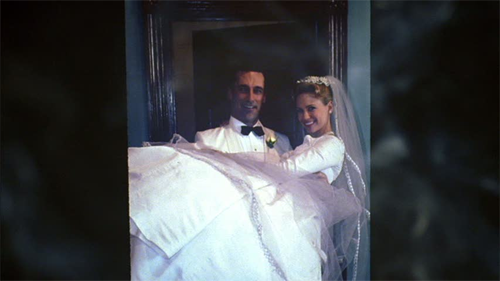
The second in a series of articles on great writing in modern media, today’s article focuses on the final episode of the first season of Mad Men. You can also check out the previous article, on Battlestar Galactica, as well as my original discussion of great writing. Arguably televisions greatest show, Mad Men is ripe with thematic and character interaction, making it possibly the best choice for an article on such a subject.
Season one of Mad Men is very much like thirteen chapters in a book – as such discussing the characters and themes apparent in the season finale is a lot like discussing the last chapter of a book. While the entire season is more than worthy of being completely dissected that is a task I am not ready to tackle all at once. Analyzing the brilliant final episode serves as a stand in for the whole season, where the long running themes of the show come together right along with the character development and plot. As is typical with Mad Men episodes each show follows a product, and the product in turn reveals aspects of the characters. The products in Mad Men are a great tool allowing the audience to have a physical representation of the shows themes while giving characters a plot device directly linked to the theme of the episode.
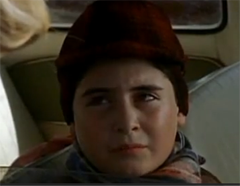 Unsurprisingly ‘Mad Men’ focuses heavily on familial themes and the struggles associated with such relationships. The show is set at the precipice of a feminist revolution and a dramatic shift in the expectations for ‘traditional’ American families. The central focus of the series is the relationship between Don Draper and his wife Betty, while this episode in particular heavily references a woman’s desire to find love and to have a family of her own. Throughout the series we witness men’s inability to fulfill those desires and a fear of betrayal from the women – and Peggy’s inability to decide which side she is on. For the characters in this drama, set in 1960, we see women coming to learn that they just do not have to put up with it anymore, and men facing a realization that they cannot get away with the things they used to.
Unsurprisingly ‘Mad Men’ focuses heavily on familial themes and the struggles associated with such relationships. The show is set at the precipice of a feminist revolution and a dramatic shift in the expectations for ‘traditional’ American families. The central focus of the series is the relationship between Don Draper and his wife Betty, while this episode in particular heavily references a woman’s desire to find love and to have a family of her own. Throughout the series we witness men’s inability to fulfill those desires and a fear of betrayal from the women – and Peggy’s inability to decide which side she is on. For the characters in this drama, set in 1960, we see women coming to learn that they just do not have to put up with it anymore, and men facing a realization that they cannot get away with the things they used to.
Pete & Trudy… & Peggy
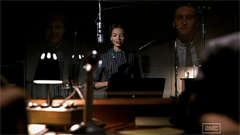 Pete and Trudy are the children on the show – together with Peggy in this episode they are symbolic of the desire to be something more, to have ‘the life,’ to reach that level of happiness that people like Don and Betty appear to have achieved. There is a sort of tragedy inherent in human existence readily apparent in the characters discussed in this episode. It has something to do with an undeniable urge to achieve some higher level of happiness that is never truly attainable, at least not to our characters. Trudy seems to live only to be a mother, she says as much to Pete in a previous episode. Her desire to have children is the only discernable reason we see for her to be with Pete in the first place – Pete’s reasoning for being with Trudy is simply to increase his social standing. Pete’s reluctance to be a father becomes ironic with the discovery of Peggy giving birth to his child – a child she does not want. From the voice over audition scene we see that deep down Peggy wants the same thing Trudy does. Peggy is so caught up in the idea that the beautiful woman in the audition is the woman she wishes she could be – that the woman can so easily have the life that she wants for herself that Peggy is so quick to tear her down when the woman cannot show her the confidence that she believes the woman must live with every day. Unlike Trudy, Peggy is not a child – she is smart enough to pass on a life that resembles what she wants, but is not. For Trudy I can feel what a crushing wakeup call it would be for her to discover the truth.
Pete and Trudy are the children on the show – together with Peggy in this episode they are symbolic of the desire to be something more, to have ‘the life,’ to reach that level of happiness that people like Don and Betty appear to have achieved. There is a sort of tragedy inherent in human existence readily apparent in the characters discussed in this episode. It has something to do with an undeniable urge to achieve some higher level of happiness that is never truly attainable, at least not to our characters. Trudy seems to live only to be a mother, she says as much to Pete in a previous episode. Her desire to have children is the only discernable reason we see for her to be with Pete in the first place – Pete’s reasoning for being with Trudy is simply to increase his social standing. Pete’s reluctance to be a father becomes ironic with the discovery of Peggy giving birth to his child – a child she does not want. From the voice over audition scene we see that deep down Peggy wants the same thing Trudy does. Peggy is so caught up in the idea that the beautiful woman in the audition is the woman she wishes she could be – that the woman can so easily have the life that she wants for herself that Peggy is so quick to tear her down when the woman cannot show her the confidence that she believes the woman must live with every day. Unlike Trudy, Peggy is not a child – she is smart enough to pass on a life that resembles what she wants, but is not. For Trudy I can feel what a crushing wakeup call it would be for her to discover the truth.
Betty
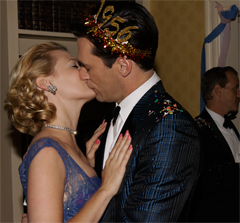
One needs to have watched the entire season to realize just how striking, and out of character Betty’s confession to her psychologist is. After a season of watching her struggle with some unknown, unanswerable bout of unhappiness and depression, one scene with her best friend Francine makes clear to her what she has known all along. How could she be so dense – hotel rooms, perfumes, two nights per week in the city? Betty would be a lot happier if her husband was faithful to her – if her fear of being Helen Bishop was not a very serious possibility for her. The show so elegantly puts these ideas together without ever explicitly saying much of anything. Here the writing simply speaks for itself – the judgmental discussion of Helen Bishop’s lifestyle around the ‘sewing circle,’ Betty crashing her car after seeing her struggle with a task expected of a man, seeing the introversion and awkwardness of Helen’s young son Glen, on and on throughout the season. In ‘The Wheel’ Betty struggles with the ultimate of failures, being locked in to the life she always wanted, but the life that never really was – her only confidant being a ten year old boy who can merely apologize for not being old enough to relate. In this way Betty is similar to Trudy (who has yet to have the realization) – once caught up in the fantasy of a happy domestic life she has struggled all season long to put up the facade of happiness. She has continued to lie to her friends, her doctor and herself because happiness is expected of her in this time and place – no matter how rare or unrealistic it may be.
Don & The ‘Wheel’
After discussing the depth of the other characters make no mistake, the entire season has focused on Don and his own demons. Don’s fear of letting anyone get too close has permeated many of the season’s episodes and caused most of his problems. Don is a lot like the other characters in the show, caught up in a dream that can never fully exist because of the lengths he went to achieve it and the tiny pieces of his soul that he has lost along the way.
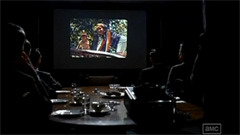 The product of the week is ‘the wheel’ – Kodak’s high tech slide projector – and Don is tasked with creating an ad campaign for it. The plot of the episode revolves around Don’s unwillingness to go visit Betty’s family over Thanksgiving due to the urgency of his work – a sort of irony I believe Don discovers by the end of the episode. The wheel forces Don to relive the journey he has taken to make it where he is today. He looks through pictures of his childhood and of his engagement; he hears the news of his brother’s suicide and I believe that he questions the decisions he has made. In a sense the wheel gives Don a second chance to recall the dream that he once lived for and to recognize the perversion of it as it now is. While his realization is in time for the big meeting with Kodak, the tragedy of the series is that it is too late for himself. The scene near the end where Don gives his pitch to Kodak is perhaps one of the most effective uses of the combination of plot, character and theme that I have had the pleasure of witnessing.
The product of the week is ‘the wheel’ – Kodak’s high tech slide projector – and Don is tasked with creating an ad campaign for it. The plot of the episode revolves around Don’s unwillingness to go visit Betty’s family over Thanksgiving due to the urgency of his work – a sort of irony I believe Don discovers by the end of the episode. The wheel forces Don to relive the journey he has taken to make it where he is today. He looks through pictures of his childhood and of his engagement; he hears the news of his brother’s suicide and I believe that he questions the decisions he has made. In a sense the wheel gives Don a second chance to recall the dream that he once lived for and to recognize the perversion of it as it now is. While his realization is in time for the big meeting with Kodak, the tragedy of the series is that it is too late for himself. The scene near the end where Don gives his pitch to Kodak is perhaps one of the most effective uses of the combination of plot, character and theme that I have had the pleasure of witnessing.
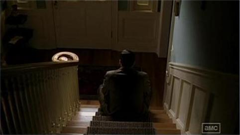
“Well, technology is a glittering lure. But there’s the rare occasion when the public can be engaged on a level beyond flash, if they have a sentimental bond with the product. My first job, I was in-house at a fur company, with this old pro copywriter. Greek, named Teddy. And Teddy told me the most important idea in advertising is “new”. Creates an itch. You simply put your product in there as a kind of… calamine lotion. But he also talked about a deeper bond with the product: Nostalgia – it’s delicate, but potent. Teddy told me that in Greek, “nostalgia” literally means “the pain from an old wound.” It’s a twinge in your heart far more powerful than memory alone. This device isn’t a spaceship, it’s a time machine. It goes backwards, and forwards… it takes us to a place where we ache to go again. It’s not called the wheel, it’s called the carousel. It lets us travel the way a child travels – around and around, and back home again, to a place where we know we are loved.” ~ Don Draper









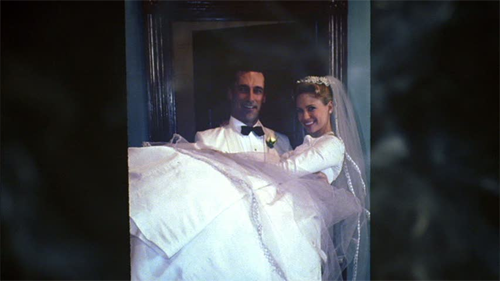
No Comment